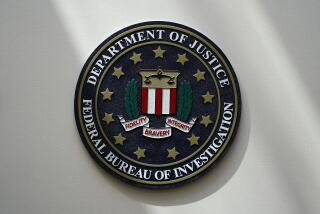House panel set for hearings on the terrorist threat within
- Share via
Reporting from Washington — Abdulhakim Mujahid Muhammad was born Carlos Bledsoe, played high school football and attended business school. He mowed his grandmother’s lawn. He converted to Islam at a Tennessee mosque, studied in Yemen, and while there reportedly fell in with a group of extremists.
By the time he returned to the U.S., federal law enforcement officials say, he had been dangerously radicalized. After he was accused of opening fire with a semiautomatic rifle on a Little Rock, Ark., Army recruiting station in 2009, he became part of a rising trend — one of 50 Americans arrested on terrorism charges in the last two years.
From May 2009 to last November, authorities broke up 22 alleged homegrown terrorism plots, compared with 21 during the previous eight years.
The House Homeland Security Committee opens hearings Wednesday into the terrorist threat in the U.S. In the weeks ahead, the panel will hold sessions on the radicalization of American Muslims.
For Al Qaeda, tapping into a new generation of potential terrorists already here is easier and cheaper than finding ways to get attackers into the country, though the result has not approached anything close to the death toll of the Sept. 11, 2001, attacks.
“The threat is real, the threat is different, and the threat is constant,” Atty. Gen. Eric H. Holder Jr. said recently.
Some suspects have displayed a chilling dedication.
Muhammad, charged with killing one soldier and wounding another, has written the judge asking to plead guilty to capital murder. He is ready to die for Al Qaeda.
“I wasn’t insane or post-traumatic, nor was I forced to do this act,” he wrote from jail. The shootings, he said, were “justified according to Islamic laws and the Islamic religion, jihad — to fight those who wage war on Islam and Muslims.”
The committee chairman, Rep. Peter T. King (R-N.Y.), has rebuffed claims from religious and civil rights groups that the hearings will unfairly target Muslim Americans.
“Al Qaeda has realized the difficulty it faces in launching attacks against our homeland from overseas,” King said Tuesday. “Thus it has adjusted its tactics and is now attempting to radicalize from within our country.”
Terrorism consultant Evan Kohlmann testified in the 2008 trial of Mohamad Ibrahim Shnewer, a Philadelphia cab driver convicted and given life in prison for his part in a six-man conspiracy to “kill as many Americans as possible” at Ft. Dix, an Army base in New Jersey.
Kohlmann said the Internet, videos and other electronic and digital platforms helped drive the plot.
“The information age means you don’t need training camps to become a terrorist; all you need is an Internet connection,” he said. “The Web is terrorism’s new frontier, offering both persuasive inspiration and practical instruction. In fact, these homegrown terrorist cells come at essentially zero cost to Al Qaeda.”
Only two cases have produced bloodshed since the 2001 attacks — the Little Rock ambush and the Ft. Hood, Texas, shooting in 2009 that killed 13 and injured 32.
Other purported plots were broken up by government informants or undercover agents, though in some cases defense lawyers have complained that authorities helped suspects plan their crimes and build their bombs, only to arrest them at the last minute.
Some were poorly organized and carelessly planned. Others fell apart by pure luck, such as when a car bomb failed to ignite on a Saturday evening in New York’s Times Square. It was placed there by Faisal Shahzad, a naturalized U.S. citizen, Connecticut financial analyst and father of two. He pleaded guilty and was sentenced to life without parole. Yet he left for prison unrepentant. “Allahu akbar” (God is great), he told the court.
Mitchell D. Silber, director of intelligence analysis for the New York City Police Department, said “the vast majority” of Americans who embraced violent jihad did not start out as religious people or very knowledgeable about Islamic teachings. But eventually a person “intensifies his beliefs, wholly adopts extremist ideology and concludes, without question, that action is required,” Silber said. Then “potential targets are chosen, surveillance and reconnaissance begins,” and finally, “jihadization” with an assault rifle or car bomb.
In Hempstead, Texas, a window washer named Barry Walter Bujol Jr. was seen visiting his local library to go online and read the latest postings from Al Qaeda leaders, such as American-born Anwar Awlaki. He allegedly exchanged e-mails with Awlaki, who reportedly sent him an attachment called “42 Ways of Supporting Jihad.”
Last year, Bujol was indicted on charges of attempting to aid terrorists; he faces 20 years in prison if convicted.
In Little Rock, Muhammad is scheduled for trial on Feb. 23, despite his wish to plead guilty. Prosecutors hope he gets what he wants — the death penalty. In one of his letters to the judge, Muhammad wrote, “I await sentencing.”
More to Read
Sign up for Essential California
The most important California stories and recommendations in your inbox every morning.
You may occasionally receive promotional content from the Los Angeles Times.










